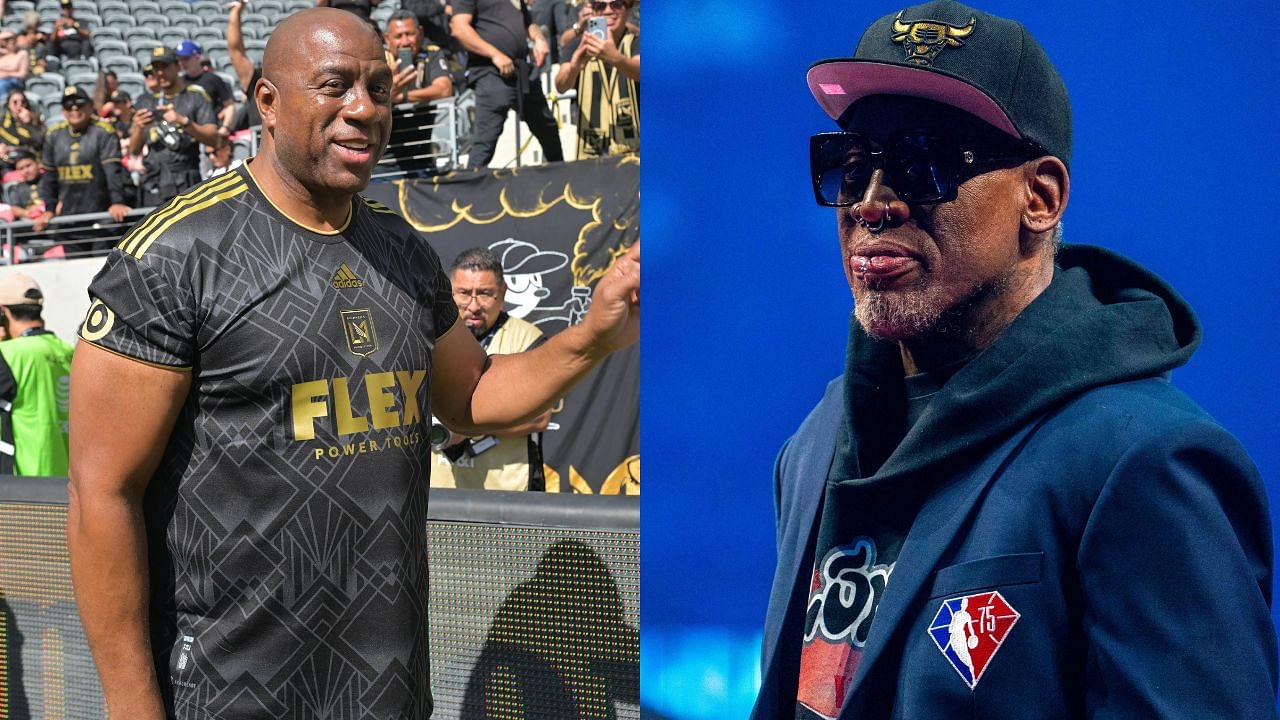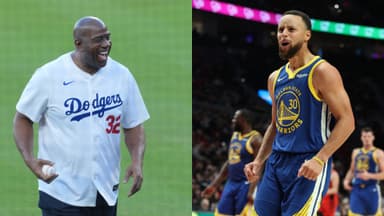The 1992 All-Star game was a historic one. Magic Johnson, who had retired from the league just before the 1991-92 season, returned to make an appearance. It was a big deal considering Johnson had quit early because of his HIV diagnosis.
Advertisement
Before the game, many players including Charles Barkley and Karl Malone had protested Magic’s return. While Barkley was sympathetic to Johnson’s case, he believed taking up a spot on the All-Star game as a retired player was unfair. On the other hand, Karl Malone believed that Johnson’s diagnosis made his presence on the court risky for other players.
However, despite the protests and awkwardness, it all became normal as soon as Dennis Rodman faced of Magic Johnson in the game.
Dennis Rodman lightened the tension by elbowing Magic Johnson
Though Dennis Rodman is seen as a bad boy, he definitely had a warm core. He displayed this quality right when Magic was facing so much resistance from his former teammates and rivals.
The time leading up to the jump ball for the 1992 All-Star game was terribly stressful for the legendary point guard. But it all ended as soon as Dennis Rodman elbowed him hard at the beginning of the game.
The two then went back and forth, throwing smack-talk at each other while Johnson drained one shot after the other. In his book When the Game was Ours, Johnson wrote of the instance in detail.
“Since Magic hadn’t played all season, the expectation was that he would be treated delicately. Yet Johnson wanted no part of being a charity case. He worked out religiously in the weeks leading up to the game, telling Lon Rosen, “If they think I’m showing up just to make a couple of passes, they’re wrong.” Rodman eliminated the awkwardness on his very first trip down the floor, when he elbowed Magic in the back, then bodied up on him and bumped him in the post. “C’mon now,” Rodman said to Magic. “Show me what you got.” Magic wheeled and rolled in a hook shot. “How did that look?” Johnson said, after the shot dropped through. “Let’s go,” Rodman said. “Is that all you have?” Johnson ran and passed and sweated and tumbled into people just like everyone else. After a few minutes, the players seemed to relax.”
On this day in 1992, Magic Johnson returned. Iconic performance.
– Retired three months earlier (HIV)
– Voted into All-Star starting lineup
– Thought it’d be his last game ever
– Dropped 25 PTS and 9 AST
– Battled MJ and Isiah
– MVP pic.twitter.com/cc8pn5taK1— Bleacher Report (@BleacherReport) February 10, 2019
To be fair, in Rodman’s head, it was just another opportunity to guard one of the greatest ever to play. He likely did not care at all about the HIV or the stress chipping away at Magic’s mental peace. Yet, by doing so, by being himself, Rodman helped Magic feel at home again.
The 1992 All-Star was groundbreaking for HIV awareness
This was one of the most important events in changing the world’s perception of HIV. Watching the legendary Magic Johnson continue dominating even after the diagnosis and seeing all other athletes accepting him, really made the difference.
In his book, Johnson confessed the importance of his 12th All-Star appearance.
“I made a nice pass, and guys were saying, ‘Oh, I remember him. He’s still Magic,'” Johnson said. “It calmed everyone down. After that, it was just about basketball. “That game helped change the perception of HIV all over the world. People watching it said, ‘It’s okay. He can do this.'”
Johnson went on to play in the 1992 Barcelona Olympics after his All-Star gig. In many ways, this was the first step the world took towards accepting victims of HIV. And there is no denying that Rodman played his part in it.








